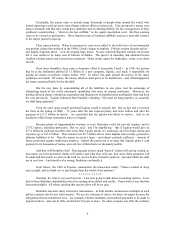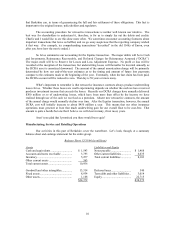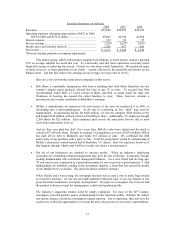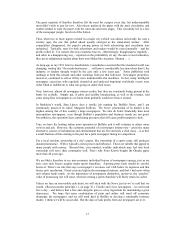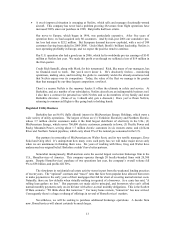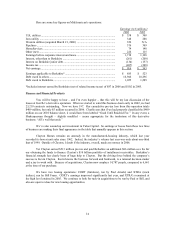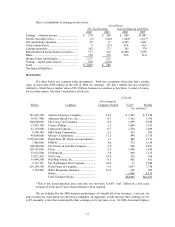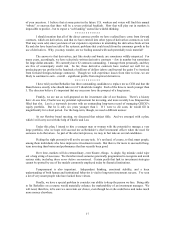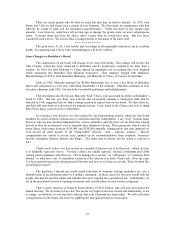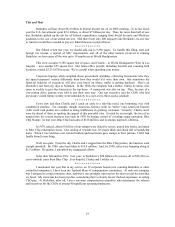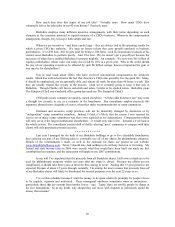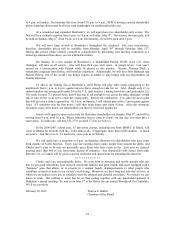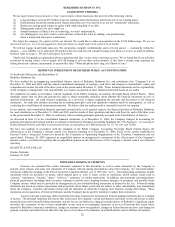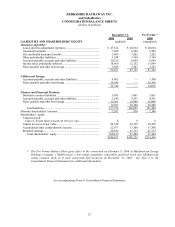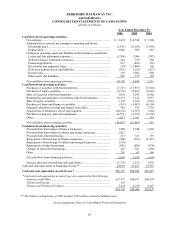Berkshire Hathaway 2006 Annual Report Download - page 20
Download and view the complete annual report
Please find page 20 of the 2006 Berkshire Hathaway annual report below. You can navigate through the pages in the report by either clicking on the pages listed below, or by using the keyword search tool below to find specific information within the annual report.This and That
Berkshire will pay about $4.4 billion in federal income tax on its 2006 earnings. In its last fiscal
year the U.S. Government spent $2.6 trillion, or about $7 billion per day. Thus, for more than half of one
day, Berkshire picked up the tab for all federal expenditures, ranging from Social Security and Medicare
payments to the cost of our armed services. Had there been only 600 taxpayers like Berkshire, no one else
in America would have needed to pay any federal income or payroll taxes.
* * * * * * * * * * * *
Our federal return last year, we should add, ran to 9,386 pages. To handle this filing, state and
foreign tax returns, a myriad of SEC requirements, and all of the other matters involved in running
Berkshire, we have gone all the way up to 19 employees at World Headquarters.
This crew occupies 9,708 square feet of space, and Charlie – at World Headquarters West in Los
Angeles – uses another 655 square feet. Our home-office payroll, including benefits and counting both
locations, totaled $3,531,978 last year. We’ re careful when spending your money.
Corporate bigwigs often complain about government spending, criticizing bureaucrats who they
say spend taxpayers’ money differently from how they would if it were their own. But sometimes the
financial behavior of executives will also vary based on whose wallet is getting depleted. Here’ s an
illustrative tale from my days at Salomon. In the 1980s the company had a barber, Jimmy by name, who
came in weekly to give free haircuts to the top brass. A manicurist was also on tap. Then, because of a
cost-cutting drive, patrons were told to pay their own way. One top executive (not the CEO) who had
previously visited Jimmy weekly went immediately to a once-every-three-weeks schedule.
* * * * * * * * * * * *
Every now and then Charlie and I catch on early to a tide-like trend, one brimming over with
commercial promise. For example, though American Airlines (with its “miles”) and American Express
(with credit card points) are credited as being trailblazers in granting customers “rewards,” Charlie and I
were far ahead of them in spotting the appeal of this powerful idea. Excited by our insight, the two of us
jumped into the reward business way back in 1970 by buying control of a trading stamp operation, Blue
Chip Stamps. In that year, Blue Chip had sales of $126 million, and its stamps papered California.
In 1970, indeed, about 60 billion of our stamps were licked by savers, pasted into books, and taken
to Blue Chip redemption stores. Our catalog of rewards was 116 pages thick and chock full of tantalizing
items. When I was told that even certain brothels and mortuaries gave stamps to their patrons, I felt I had
finally found a sure thing.
Well, not quite. From the day Charlie and I stepped into the Blue Chip picture, the business went
straight downhill. By 1980, sales had fallen to $19.4 million. And, by 1990, sales were bumping along at
$1.5 million. No quitter, I redoubled my managerial efforts.
Sales then fell another 98%. Last year, in Berkshire’ s $98 billion of revenues, all of $25,920 (no
zeros omitted) came from Blue Chip. Ever hopeful, Charlie and I soldier on.
* * * * * * * * * * * *
I mentioned last year that in my service on 19 corporate boards (not counting Berkshire or other
controlled companies), I have been the Typhoid Mary of compensation committees. At only one company
was I assigned to comp committee duty, and then I was promptly outvoted on the most crucial decision that
we faced. My ostracism has been peculiar, considering that I certainly haven’ t lacked experience in setting
CEO pay. At Berkshire, after all, I am a one-man compensation committee who determines the salaries
and incentives for the CEOs of around 40 significant operating businesses.
19


